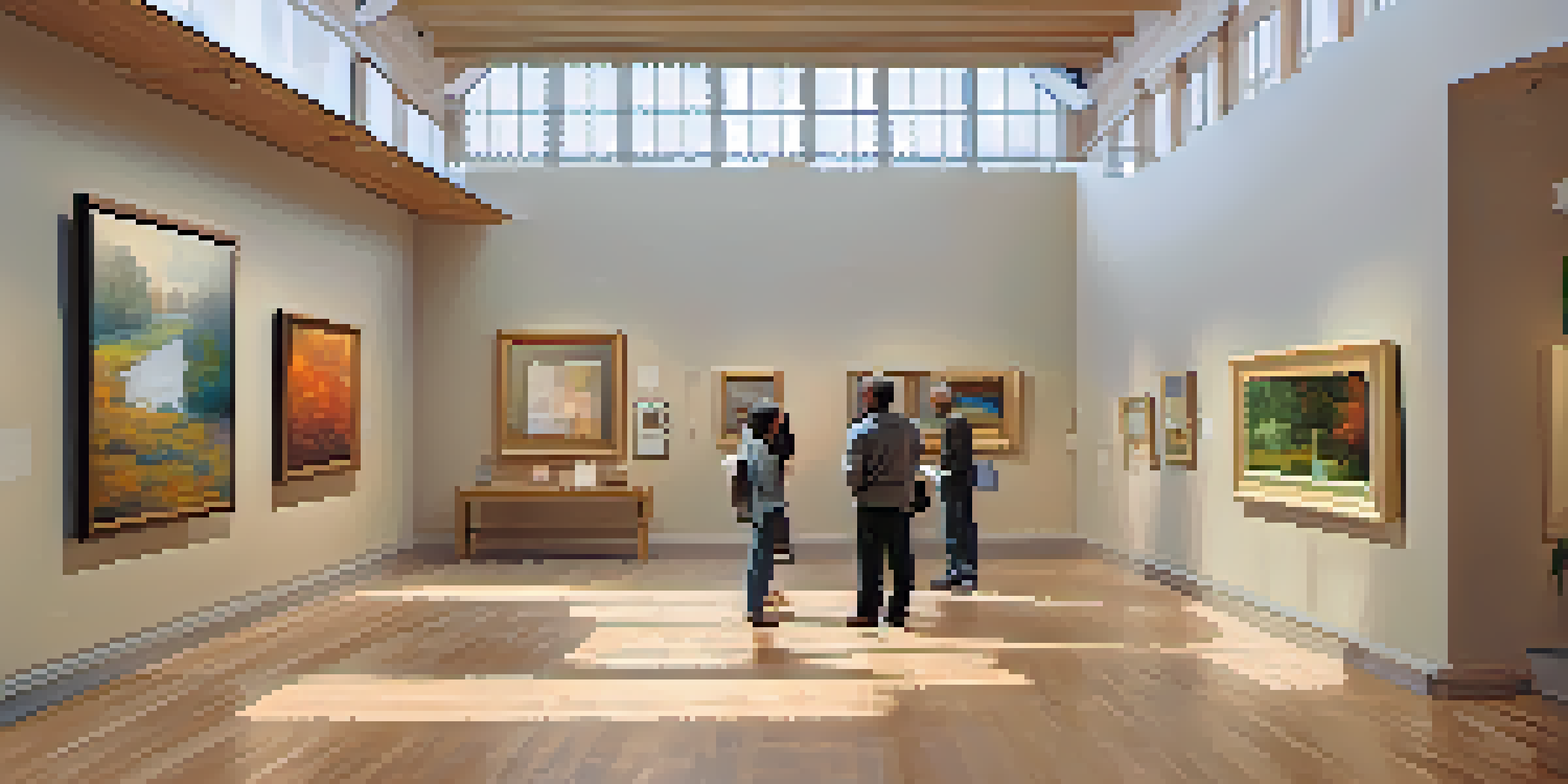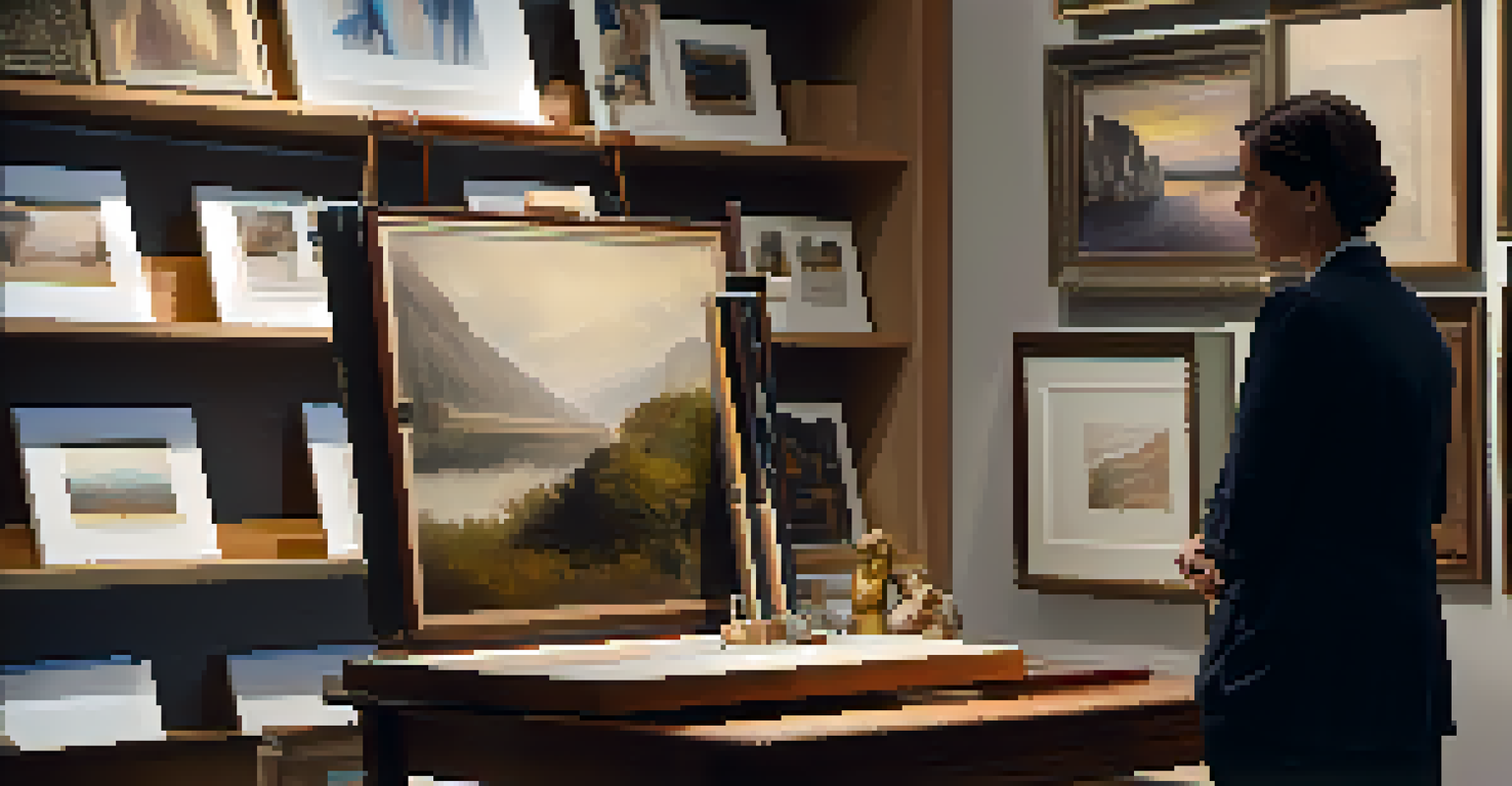The Role of Art Advisors: When to Seek Professional Help

What is an Art Advisor and Their Role in the Art World?
An art advisor is a professional who helps collectors and investors navigate the complex art market. They provide expertise in selecting, purchasing, and managing art collections, ensuring that clients make informed decisions. Think of them as your personal guide through an often overwhelming landscape of galleries, auctions, and artists.
Art is not what you see, but what you make others see.
Art advisors are not just for the wealthy; they can assist anyone looking to build or enhance their collection. They offer insights into market trends, help identify emerging artists, and provide access to exclusive opportunities. Their knowledge can save you time and potentially significant amounts of money, especially if you're new to collecting.
In essence, an art advisor acts as a bridge between you and the art world, helping you identify what resonates with you personally while also considering investment potential. Their role is to ensure that your art collection reflects both your taste and your financial goals.
Reasons to Consider Engaging an Art Advisor
One of the main reasons to seek out an art advisor is to gain access to specialized knowledge and experience. The art market can be unpredictable, and having someone who understands the nuances can be invaluable. For example, they can help you avoid common pitfalls, such as overpaying for a piece or investing in art that doesn't hold its value.

Additionally, art advisors often have established relationships with galleries and auction houses, giving you an edge in acquiring sought-after works. This insider access can also lead to opportunities that the average collector might miss. Imagine having the chance to purchase a piece before it even hits the public market—that's the kind of advantage an advisor can provide.
Art Advisors Enhance Collecting
Art advisors provide expertise and personalized guidance to help collectors navigate the art market effectively.
Lastly, if you're feeling overwhelmed by the sheer volume of choices in the art world, an advisor can help clarify your vision and streamline the selection process. They can work with you to refine your aesthetic and focus your collection, ensuring that it remains cohesive and true to your personal style.
When to Seek Help from an Art Advisor
It's a good idea to consider hiring an art advisor when you’re ready to make significant purchases or build a serious collection. For instance, if you find yourself eyeing multiple artworks but are unsure which will truly enhance your space, an advisor can provide guidance on the best choices. This is especially helpful if you're at a crossroads and need a second opinion to boost your confidence.
The best way to predict the future is to create it.
Another crucial time to seek help is when you’re looking to sell art or assess the value of your collection. An advisor can accurately appraise your pieces and advise on the right timing and method for selling. This kind of expertise can maximize your returns and ensure you don’t leave money on the table.
Lastly, if you’re embarking on a new area of collecting, such as contemporary art or emerging artists, an art advisor can be your best ally. They can help you navigate these unfamiliar waters, providing insights and recommendations that align with current trends and market demands.
How to Choose the Right Art Advisor for You
Selecting the right art advisor is crucial for a successful partnership. Start by considering the advisor's area of expertise and whether it aligns with your interests. For instance, if you're passionate about modern art, seek someone with a proven track record in that niche.
Another important factor is the advisor's communication style and approach to client relationships. You want someone who listens to your needs and preferences, making you feel comfortable sharing your ideas and concerns. A great advisor should not only be knowledgeable but also approachable, creating a collaborative atmosphere.
Financial Benefits of Advisors
Hiring an art advisor can lead to better purchasing decisions, avoiding costly mistakes and maximizing returns on investment.
Lastly, consider their reputation within the art community. Look for testimonials or reviews from previous clients to gauge their effectiveness and integrity. A strong advisor will have a network of satisfied clients and a history of successful transactions, ensuring you’re in capable hands.
The Financial Benefits of Hiring an Art Advisor
While hiring an art advisor might seem like an additional expense, it can actually lead to considerable financial benefits in the long run. Their expertise often translates into better purchasing decisions, which can result in higher returns on investment. For example, an advisor can guide you toward pieces that are expected to appreciate, ensuring your collection grows in value over time.
Moreover, art advisors help you avoid costly mistakes, such as overpaying for artwork or investing in pieces that lack potential for appreciation. They can also provide insights into the market that you might not be aware of, which can be a game-changer when deciding whether to buy or sell.
In this way, an art advisor is not just a luxury; they can be a wise investment for anyone serious about collecting art. By facilitating informed decisions and providing valuable market insights, they help you build a collection that offers both personal satisfaction and financial reward.
Art Advisors vs. Other Resources: What Sets Them Apart?
You may wonder how art advisors compare to other resources, like online platforms or social media groups. While these can provide useful information, they often lack the personalized guidance and expertise that a dedicated advisor offers. An advisor goes beyond generic advice, tailoring their support to your specific goals and preferences.
Additionally, art advisors have access to exclusive events, private viewings, and firsthand knowledge about upcoming artists and trends. This insider access is something that online resources simply can’t replicate. Think of it as having a trusted friend in the industry who opens doors for you.
Personalized Support Over Resources
Unlike online platforms, art advisors offer tailored advice and insider access that greatly enhance your art collecting experience.
Ultimately, while online resources can be great for research, an art advisor provides a level of personalized service and expertise that can enhance your art journey significantly. This relationship can lead to a deeper and more rewarding collecting experience.
Conclusion: Making the Most of Your Art Advisor Experience
To make the most of your relationship with an art advisor, start by being open about your goals and preferences. The more they understand what you’re looking for, the better they can assist you. Don’t hesitate to ask questions, share your thoughts, and express any concerns you may have—communication is key.
Also, be prepared to trust their expertise. While it’s important to maintain your vision, their knowledge of the market can lead you to pieces you might not have considered otherwise. Sometimes, stepping outside your comfort zone can yield the most rewarding results.

Finally, enjoy the journey! Working with an art advisor should be an enriching experience that deepens your appreciation for art. Embrace the learning process, and you may find that the connections you build and the insights you gain are as valuable as the artworks you collect.